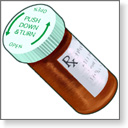| Drug treatments: Other drug therapies |

Although used less frequently than other cholesterol-lowering medications, there are times when other drug treatments, such as fibrates, may be appropriate.
Fibrates
The cholesterol-lowering drugs called fibrates are primarily effective in lowering triglycerides and, to a lesser extent, increasing HDL (good) cholesterol levels.
Medications in this class include fenofibrate (Antara, Lofibra, Tricor, and Triglide) and gemfibrozil.
Fibrates are generally not considered first- or even second-choice drugs for lowering cholesterol, because they are not very effective at lowering LDL cholesterol. They are used when help is needed to bring down triglycerides, often in combination with other cholesterol-lowering medications that do lower LDL cholesterol.
Fibrates have been shown to lower triglycerides by 20 - 50% and to increase HDL cholesterol by 10 - 15%.
The most common side effects include gastrointestinal symptoms (including stomach pain, diarrhea, nausea, vomiting, and constipation) and an increased risk of developing gallstones.
Fibrates can increase the effect of medications that thin the blood (such as warfarin). Your health care provider should monitor this closely, as well as your liver function, which may be affected by fibrates.
When fibrates are taken together with statins (another cholesterol-lowering medication), there is an increased risk of muscle tissue breakdown and kidney failure. The safety and effectiveness of fibrates in children is not known.
Reviewed By: Glenn Gandelman, MD, MPH, FACC Assistant Clinical Professor of Medicine at New York Medical College; Private Practice specializing in Cardiovascular Disease in Greenwich, CT. Review provided by VeriMed Healthcare Network.
© 1997- A.D.A.M., a business unit of Ebix, Inc. Any duplication or distribution of the information contained herein is strictly prohibited.
